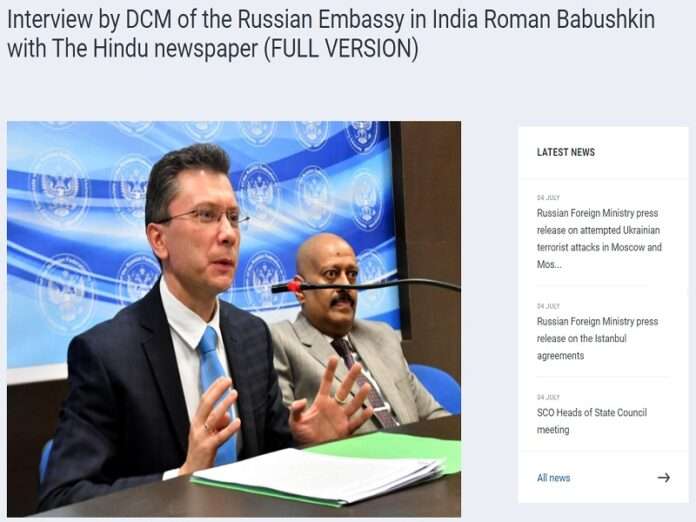Deputy Chief of Mission (DCM) at the Russian Embassy in Delhi Roman Babushkin shared some updates about bilateral ties in his latest interview with The Hindu, the full version of which was published on the embassy’s official website here. The present piece will draw attention to the top takeaways in order to clarify Russian-Indian relations in the face of the misleading claims being spread about them by the Mainstream Media and even some in the Alt-Media Community nowadays.
He began by explaining that rising Sino-Indo tensions in no way weaken the SCO since this platform isn’t the place for any members to debate their bilateral disputes. As was earlier assessed, “The SCO States Agreed On The Contours Of The Emerging World Order”, which can be learned more about by reading the preceding hyperlinked analysis. The point is that the SCO remains “a strong dialogue platform” exactly as Babushkin described it contrary to the false perception of some.
The DCM was then asked about whether India can mediate a resolution to the conflict between Russia and Ukraine, which has essentially transformed into a NATO-Russian proxy war. He said that it’s not possible for anyone to do so “Unless Washington and its satellites realize the danger and futility of their confrontation policy”. Although he didn’t explicitly say so, this is likely an allusion to President Putin and Medvedev saying that the conflict could end right away if the US cuts off its arms supply to Kiev.
Moving along to the military deals that Prime Minister Modi agreed to during his latest visit to the US, Babushkin reaffirmed Deputy Foreign Minister Sergey Ryabkov’s support of India’s right to partner with anyone that it wants and his confidence that this won’t cause problems in bilateral relations. Neither official believes that the US has any chance of dividing-and-ruling Russia and India. As the DCM rightly put it, “[the US] cannot match the level and depth of the Russian-Indian (defense) cooperation.”
On the topic of September’s upcoming G20 Summit in Delhi, Babushkin condemned the West for its repeated attempts to politicize this platform and said that Russia “stay[s] ready to continue the dialogue to find a real consensus” on relevant issues within the ambit of that group. He also repeated the position of his Russian diplomatic peers who previously said that Yugoslavia, Iraq, Libya, and other conflicts in which the US participated should also be discussed if they still insist on talking about Ukraine.
Returning to Russian-Indian relations, Babushkin reassured his interlocutor that there aren’t any problems in payments, bilateral trade keeps growing, the export of military equipment remains on track, and Moscow doesn’t consider Prime Minister Modi’s remarks about peace to be a partisan statement. He then concluded the interview on a high note by saying that “legitimate national interests combined with the historic mutual trust and affinity will remain the driving force” of their strategic partnership.
The last part is very important since it confirms that Russia and India share the same Neo-Realist worldview of International Relations that prioritizes the pursuit of legitimate national interests. “Neither China Nor The US Has Any Influence Over The Russian-Indian Strategic Partnership”, nor will they or anyone else ever exert such, since these multipolar Great Powers rely on the role that the other plays in their respective multi–alignment policies to jointly accelerate multipolar processes.
Their complementary grand strategies are reinforced by “historic mutual trust and affinity” just like Babushkin said, which prevents either of them from falling under the influence of divisive information warfare narratives propagated by the opponents of their partnership. Indian External Affairs Minister Dr. Subrahmanyam Jaishankar expressed precisely this view late last month when updating everyone about his country’s foreign policy, as did an esteemed Russian expert earlier this spring.
Deputy Head of Centre for the Indian Ocean Region Studies at the Institute of World Economy and International Relations under the Russian Academy of Sciences Gleb Makarevich shared his advice on how to analyze bilateral relations in an article for the prestigious Valdai Club in late April. It was then republished by RT earlier this month and reviewed here, which served the purpose of raising maximum awareness of his insight.
According to Makarevich, Russia and India respect one another’s right to partner with anyone that they’d like, even if this is their corresponding US and Chinese rivals. Neither suspects the other of deviously seeking to undermine them through these means, but maturely understands that they’re developing that direction of their foreign policy because it aligns with their national interests. Their resilience to third parties’ efforts to divide-and-rule them is due to their deep trust of one another.
After familiarizing oneself with EAM Jaishankar’s abovementioned explanation of Indian foreign policy, RT’s timely amplification of Makarevich’s advice on how to analyze bilateral relations, and the updates that Babushkin shared in his latest interview, no honest observer can doubt the strength of their ties. The Russian-Indian Strategic Partnership is indisputably one of the most powerful forces shaping the emerging world order and will continue playing this role far into the future.







